Written by Nicole
Author’s Note: This is quite a long blog post on a very contentious topic. While I welcome disagreement, I humbly ask that you read the whole thing before leaving your comment. Please read to understand, rather than to reply. Additionally, this post was written by me, Nicole, not Christelyn. My views are my own, not anyone else on this platform. Direct any vitriol you have after reading towards the message in the comments, not the messenger, not CK, not T, not each other. Thank you.
Remember back in January when a famous public figure died in a tragic accident, and people brought up a rape case that had happened nearly two decades before? It was too soon, they said. The timing was wrong, it was inappropriate, the time to have that discussion was when it happened, and so forth.
And then a black woman journalist asked a friend of the decedent about the case, and was summarily mocked from all sides. A funky dog-headed bitch, if memory serves.
While not quite the same, a similar scenario is happening now. Another black male was murdered by the police, and a very small number of black women on social media are using the increased visibility to shine a light on black women’s murders, at the hands of law enforcement, and from other males too. Please note: I am not commenting on the murder itself, rather, the reaction to it, and previous similar circumstances, that I have seen by black women.
As we all know, the murder of black women is only significant if it was a cop or her crazy white boyfriend who did it. Black lives matter, but the male ones matter more. Black lives only matter when one is snuffed out by racist white folks. As is unsettlingly common though, whenever a black woman centers herself as a priority, there will be a horde of black women chomping at the bit to make sure that her son, brother, nephew, lover, daddy, grandpa, and male cousins twice removed, always take priority.
I have a theory. At some point in the black woman’s life, she goes to an optometrist. At that appointment she is fitted with special glasses that allows her to see her male family members in the face of every random black dude, from upstanding citizen to derelict criminal. These magic glasses also make her see every single black woman as second class in comparison, even when she looks at herself in the mirror. Obviously, I say that as an exaggeration, but it feels like there is some kind of crazy programming that is going on and it is inexplicable without some celestial force being the cause. But I digress.
With that said, let’s evaluate three studies about black femicide, and why the right time to discuss it is unlikely to be any time soon.
Here is a photo that has been circling black women’s social media the last day or two, using data sourced by the Our Lives Matter Facebook page (which everyone should go follow right now).
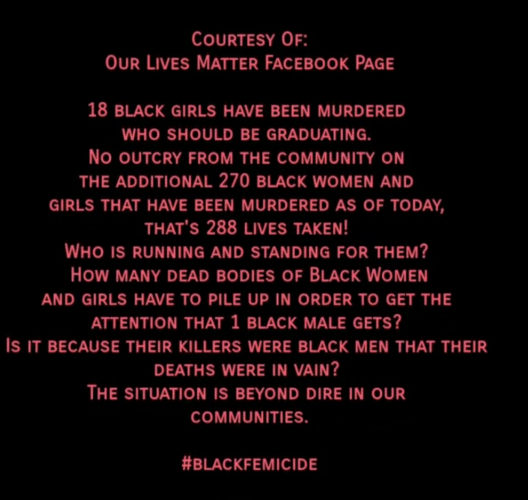
288 is out of date. Recent figures are over 300 now.
Now, here is a sample of some particularly troubling comments, by black women, in response to the photo. Emphasis is mine. I do not want to drive hate to the sources so I am not including names.
“This is kinda tasteless…just mention them no need for the comparison. Especially not right now.”
“I don’t think it has to be an either them or us divisiveness. And yes we matter but can we pick a time other than now, to do this. So as not to take away from this cause. The other issue with this is, the current climate, we are fighting THEM killing US. And yes, Black on Black crime is an issue but screaming WE kill us too takes away from the movement and I really do not think that is the intent. I would be more than happy to fight against Black domestic violence but unlike the OP, I don’t want to pick a side.”
“It’s not effective, to fight against police brutality AND black on black violence at the same time. If we focus on one and can get the impact we want, then we can focus on the other. It’s like saying fight the enemy at the door but fight your brother in the house at the same time. We DO need a united front but in all things, focus on one at a time for the most effectiveness. But of course, this is America and you guys are free to fight all causes at the same time as you see fit.”
“Nah, I understand the spirit behind the words, yet I will not agree with the words, they are divisive. Now is a time for UNITY!!”
“This is toxic! Why are we comparing?”
“My pain will not differentiate between my five black sons and my only black daughter.”
Again, all of these comments were left by black women on a photo that highlighted black women who have been murdered this year alone.
Imagine all this consternation about division when a concerning number of the same males that everyone centers, thinks like this:
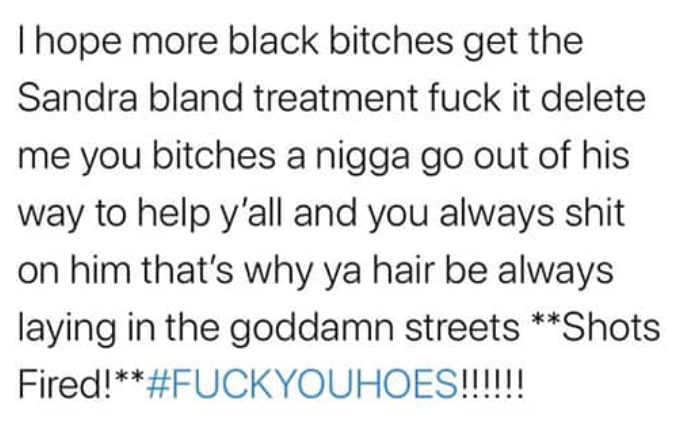
Or like this:
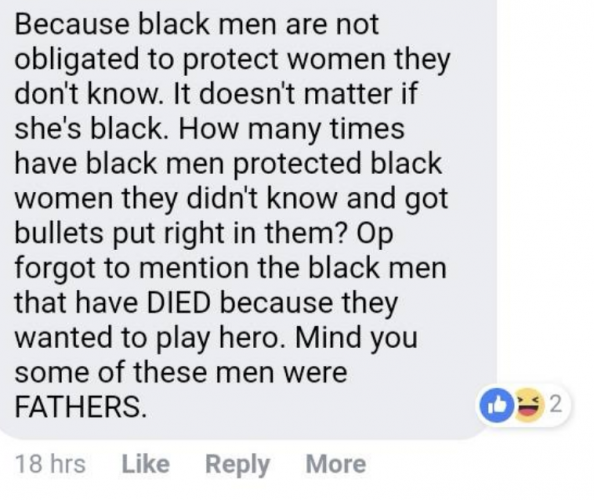

Or, despite constant mistreatment, still want you to go to bat for them:

Or think like this:

Or like this:

Or like this – (for context, this commenter had this to say about the 17 year old girl who recorded the incident):

Or throw their support behind black male causes even though those same black males are killing black women at astronomical rates:
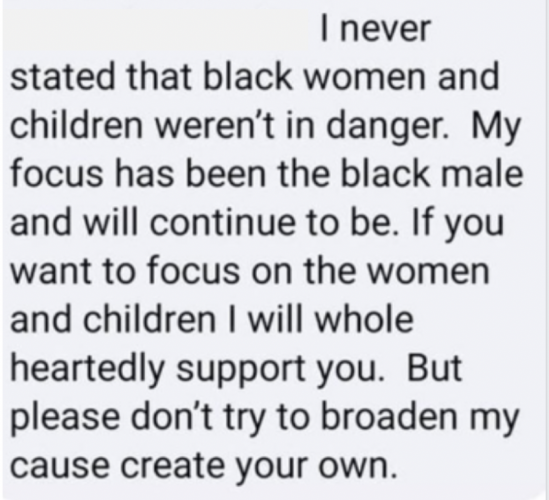
Or loudly and proudly declare their aversion to financially provide for children that carries half their DNA:
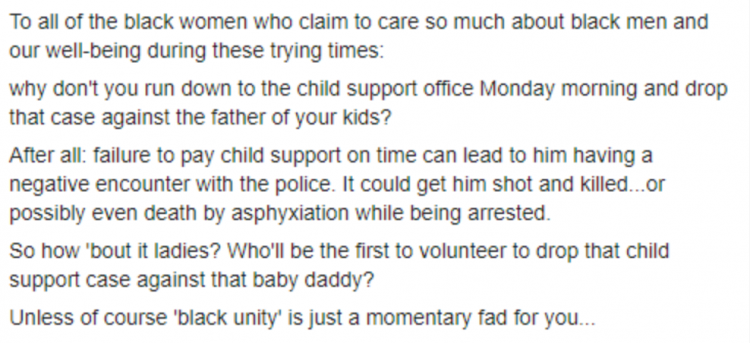
But you see your brother when you see these dudes? Do they see you as their sister though? They don’t.
Image credits: For Black Women – What Not To Buy, Black Women Divest and miscellaneous social media posts. Posts that were rather easy to find, might I add. Not all, though, right?
These are black women who claim it is divisive to put your interests as a black woman first. These are women who believe that we can’t fight police brutality and intra-racial violence simultaneously, and choose to throw their support behind the cause that is statistically less likely to impact them or their families (police brutality), instead of one that has a significantly higher chance of happening to them (domestic violence), in defense of a demographic most likely to turn HER into some kind of negative statistic (black males), who do not return the favor.
Women like these are the reason that the majority of black girls face some sort of sexual abuse before they turn 18. Because it’s divisive to bring up their issues and demand accountability and justice. They would rather put a black girl child through hell, than “put another brother in jail”.
Because of women like these, black women’s causes will never get equal shine, because sadly these kinds of women are a vocal majority and will ensure that no one smears the image of the black male. Because comparing is toxic, you see.
Women like these, in part, are why crime in the black community is as rampant and unchecked as it is – because no matter what, no matter the crime, the perpetrator will have a soft spot to land. Victim be damned. That’s why Pookie and Ray Ray can do a 15 year bid for something especially heinous, and still be welcomed with open arms by his female family members.
Because no matter what, black women are male identified to the point where they no longer see themselves as women, rather, as a means to usher in more males. As for the daughters, they are on their own. You, me, my sister, your cousin, your nieces, all of whom are someone’s daughter, just don’t matter. These black women are dangerous and can pose a risk to your safety.
So since it is so divisive and toxic at this time in particular, when would be the right time to draw attention to this glaring issue in our community? Somehow I feel like the answer will be April 31st. Septembruary 47th. The 12th of Never.
On that note, I’m going to call bullshit here.
Though the photo version above first appeared on my timeline yesterday, the text on the photo was originally written by the Our Lives Matter page owner on May 8:
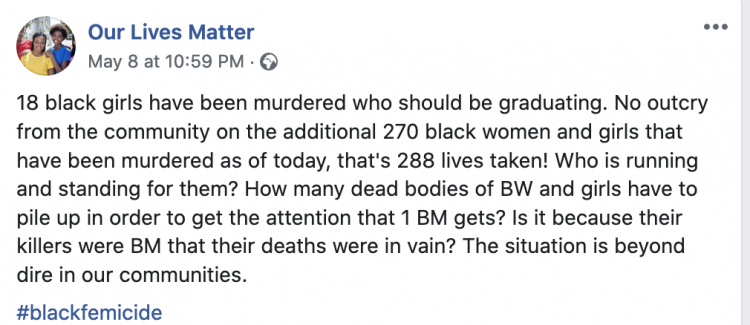
Was it divisive and toxic and unfairly compared 2o something days ago? If not, why did that post not gain as much traction? Hmm???
Much like black women rushing to say “not all men” when the mirror is held up to toxic male behaviors, black people have been quick to say that they have definitely seen victims like Breonna Taylor gain traction on social media. And while that may be true, once again, I have to call bullshit, because:

Followed by (There were no related hash tags at the time of the screenshot):
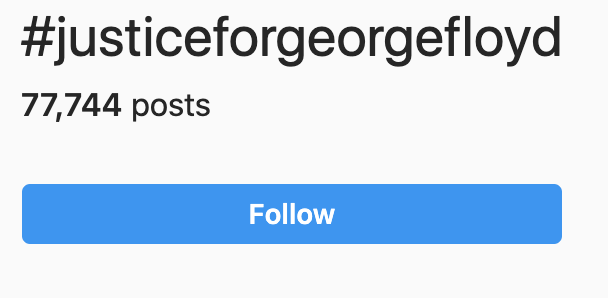
And:

These are screenshots from Instagram that I took on May 28th. As you can see, there is a huge discrepancy of the number of posts compiled under those hashtags. You can tell where the priorities are…and are not. And as it turns out, the hashtag for Breonna Taylor has ten subsequent related hashtags…of which ONE (#sayhername) is aimed at black female victims. Even hashtags don’t get to stand alone without competition.
So then I had a look at #sayhername:

And there are more posts there, which is to be expected as it is a more generic tag, and it has been around longer. But once more, the related hashtags still skew heavily to black male victims, at 7 out of 10.
And then I looked at a few others to see if my eyes deceived me:




The related hashtags in the fourth example are particularly revolting.
And THEN I went back to look at the original hashtags a day later:



Because Instagram is not necessarily a reliable source, I checked out Google Trends too:


So while your individual timeline may be documenting black femicide, yours is the exception, not the rule. By no means are my Instagram and Google screenshots a peer-reviewed study, but it does show you, in real time, in black and white, where the priorities lie. And it’s not with your likeness and image. There’s your division.
I saw this photo on Instagram not too long ago, posted by a black woman.
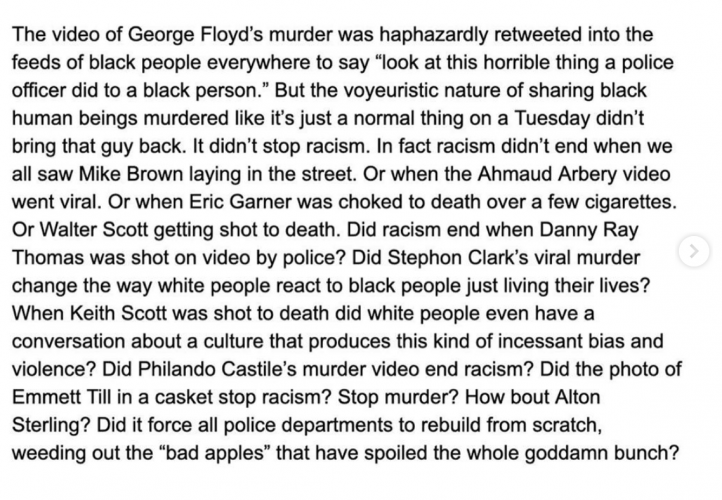
I am not diminishing her pain or the points she made. I’m just wondering where all the black women who died at the police are in her mentions here. Because there are many to choose from.
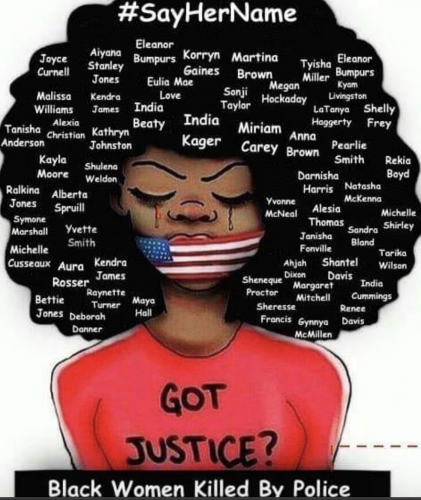
Artist unknown – if you know who did this please leave a comment so we can attribute credit.
The fact that most of us probably know a small number of those names speaks to the black femicide problem. Now is not a good time though, right?
Breonna Taylor was murdered by cops, in her home, fairly recently. The fact that many people have not heard about her case is a sign of the problem here. The reason that people don’t know about it could be because there has not been video of her murder, compared to the other two cases. However, that begs the question, does video have to be present to muster up the outrage? Is that the defining factor in the difference of response? Does the fact that it happened not stir up anger as it is? The fact that people were more concerned about her surviving boyfriend getting justice, another problem. As a black woman, I am constantly amazed at other black women putting everyone’s plight, especially the black male plight, above our own. Don’t get me wrong, I don’t want people murdered in the street. But when a black woman is murdered, there is no widespread coverage or outrage or marches or protests or movements in her name. Our Lives Matter, a page that every black woman should be following, posts news stories about black women and children getting brutalized DAILY. Every. Single. Day. And not once have I seen a march for any of those women’s tragic deaths.
But apparently this is a bad time to talk about it, because centering ourselves is divisive. Pointing out these discrepancies out is divisive. Wanting reciprocated loyalty is divisive, and choosing to abstain from marching is a punishable offense. Demanding that black men who kill black women be held accountable, is, you guessed it, it’s divisive.
Black people have expressed how tired they are on social media. And you know what? I’m tired too. I’m tired of being relegated to second, third, and twenty-seventh class citizens within the community. I’m tired of being in a tiny minority of black women who wonder why my fellow black women think that aggressively acting in my best interest is this horrible, evil thing.
It seems a black woman’s life only matters in relation to the man who took it. So if a black woman is murdered by a black man, she gets the “she should have chose better” argument that everybody looooooves to throw around. Her life doesn’t get any recognition, not even a hashtag most of the time. Additionally, if a black man murders her, we will get treated to the “it’s proximity!” argument, even though the RATE, i.e. how frequently these murders happen, is the problem. If a cop murders her, funnily enough, the officer gets the benefit of the doubt. We all know that black women have problems with our mouth and just don’t comply, right?
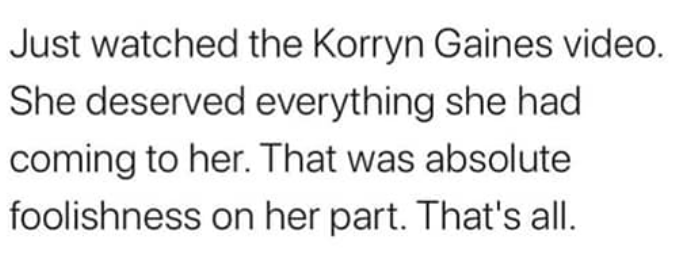
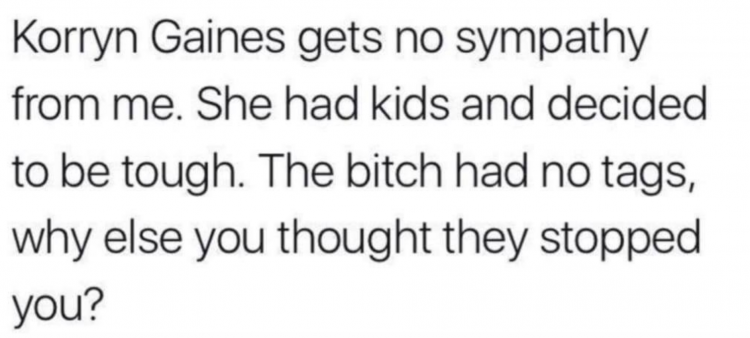

All three written by black males in reference to a dead black woman.
The time will never be right to talk about black femicide. You know why? Because black women don’t want to accept that we are the mothers of monsters. That we too play a role in the tragic state of the community, before white racist cops even enter the picture. So even though we are the demographic most likely to die by violence at the hands of the same brothers, daddies, and sons we see in every black male, we just ignore it, hoping that not discussing our plight will somehow make it better. It is painful and uncomfortable. But the time will never be right because someone, somewhere, will take issue with you centering your own image and likeness over anyone else’s, and voicing your right to do so. The people taking issue includes other black women. Because black women see their sons, fathers, uncles, and brothers in the face of any and every random black dude, you, as the image of her, or her daughter, her mother, her aunt, or her sister, must be relegated to tenth place, after everyone else.
It seems like every black woman has a black son or dad to protect. That’s why without fail, you’ll see “that could have been my [insert male relative here]. How many times have you seen “that could have been my [insert female relative here]”? For me…just once, and it was from a woman. I’ve never seen black males say it. And even though black women violently die in everyday life more than black males are murdered by cops, the outpouring of support, be it via each other as black women, or that long forgotten, short-lived #girldad thing, is absent.
For a population who don’t want to ask the tough questions, or face difficult truths, there will never be a right time to talk about why black women are so frequently victims of homicide, via the police or otherwise, without even a fraction of the outrage. And that resistance will literally kill us.
There is no bad time to discuss black femicide. The time is now.
Contact Louisville Mayor Greg Fischer and Thomas Wine, Commonwealth’s Attorney, to demand that the killers of Breonna Taylor be fired, arrested, and charged, and an investigation independent of the Louisville Metro Police Department be launched: Mayor’s Office (502) 574-2003.
Commonwealth’s Attorney (502) 595-2300: [email protected]
Call for the killers Sergeant John Mattingly, Detective Brett Hankison, and Detective Myles Cosgrove, who were merely placed on administrative leave to be fired immediately, arrested, and charged with Breonna’s murder by contacting the Louisville Metro Police Department: Chief Steve Conrad (502) 574-7660.
Demand that the Kentucky Governor order the Kentucky Attorney General launch an investigation into these murders and charge the officers who carried out this crime.
Contact Kentucky Governor Andy Beshear at (502) 564-2611 or [email protected]
Contact Attorney General Daniel Cameron at (502) 696-5300 and [email protected].
Contact details above sourced from Our Lives Matter. If you know of any other ways to get justice for Breonna Taylor, please leave a comment and this post will be updated.
Disclaimer: This blog was written by me, Nicole, and my ideas are not necessarily reflective of Christelyn Karazin or other writers on this platform.